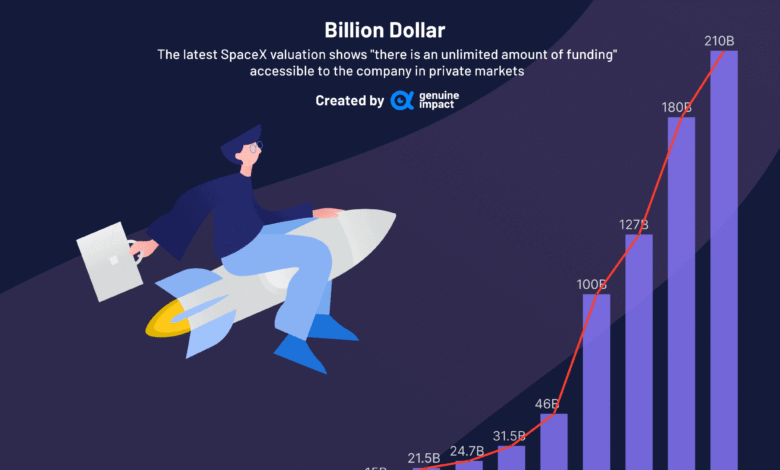SpaceX Valuation: A Journey from Startup to Dominance

SpaceX valuation currently sits at an impressive $400 billion, a reflection of its pivotal role in revolutionizing U.S. access to space. Founded by Elon Musk in 2002, the company initially faced significant hurdles, notably with its first rocket, the Falcon 1, struggling to make its mark in a market dominated by entrenched players. However, strategic NASA contracts SpaceX secured transformed the company’s fortunes, turning it into a leader of commercial space exploration. The remarkable growth led to a series of successful SpaceX launches and partnerships that pushed the boundaries of what was previously thought possible in aerospace. With innovative projects like the Starlink satellite network, SpaceX continues to shape the future of space technology and exploration.
The valuation of SpaceX has become a hot topic in investor circles, marking a significant moment in the company’s journey. Since its inception in 2002 by visionary entrepreneur Elon Musk, SpaceX has effectively carved its niche within the aerospace sector, challenging industry stalwarts. The successful development and launch of various rockets, including the famed Falcon 1 and the Falcon 9, have been instrumental in attracting lucrative contracts from NASA. Additionally, SpaceX’s ventures into satellite technology and space travel have underscored its commitment to pushing the limits of innovation. As more governments and private entities turn to this trailblazer for launch services, the financial implications continue to resonate across the globe.
The Rise of SpaceX: A New Era in Aerospace
SpaceX’s journey began in 2002 when entrepreneur Elon Musk envisioned a transformative aerospace company that would challenge the status quo in space travel. With his savings from the sale of PayPal, Musk launched SpaceX to engineer innovative rockets and reduce space access costs. The first step was the development of the Falcon 1 rocket, designed to establish a foothold in a market dominated by long-standing players like United Launch Alliance, which charged exorbitant fees for satellite launches. Musk’s ambition was clear: to revolutionize aerospace and make space accessible to a wider range of entities, not just government agencies.
In the early days, SpaceX faced fierce competition from various startup aerospace companies seeking entry into a market that was largely monopolized. Lori Garver, a former NASA deputy administrator, highlighted the significant hurdles posed by this landscape, where major contracts were often awarded to established giants. However, Musk’s bold approach to product development and his determination to showcase the Falcon 1 in Washington garnered attention from key government sectors, setting the stage for future contracts.
SpaceX Valuation: $400 Billion and Growing
As of July 2024, SpaceX’s valuation has soared to approximately $400 billion, a testimony to its revolutionary impact on space transport and commercial opportunities. This astronomical valuation reflects the success of its numerous government contracts, particularly with NASA. The company’s pivotal role in commercial space missions, bolstered by revolutionary technologies like the Falcon 9 rocket and Dragon capsule, has made it a dominant player in the aerospace sector. The recent report underscored SpaceX’s strategic positioning in the market as it continues to secure contracts that enhance its valuation further.
The importance of SpaceX in the U.S. space endeavors cannot be overstated. Since receiving significant contracts from NASA, including the $1.6 billion Commercial Resupply Services contract in 2008, SpaceX has not only proven its capabilities but also secured its financial foundation. The company has effectively turned its initial struggles—such as the failed Falcon 1 launches—into a remarkable portfolio that now includes groundbreaking projects like Starlink, which provides high-speed internet across the globe. The trajectory of SpaceX’s valuation demonstrates not just financial growth, but also a commitment to pioneering advancements in space exploration.
NASA Contracts: A Lifeline for SpaceX
The relationship between NASA and SpaceX has been instrumental in the latter’s rise to prominence within the aerospace industry. SpaceX’s groundbreaking success can be traced back to the vital contracts awarded from NASA, especially during challenging times. One pivotal moment was the $1.6 billion Commercial Resupply Services contract that drastically changed the company’s fortunes by allowing it to demonstrate its capabilities in supply missions to the International Space Station (ISS). This contract not only validated SpaceX’s technology but also established it as a key partner for NASA in commercial spaceflight.
Following its initial success, SpaceX secured a further $2.6 billion NASA contract to develop human-rated spacecraft. This contract was essential for revitalizing SpaceX during a financially precarious period. By allowing the company to expand its capabilities, SpaceX was able to demonstrate that reliability and cost-effectiveness could go hand in hand in launching astronauts. This collaboration highlights how government contracts have been a lifeline for SpaceX, enabling it to invest in new technologies, expand its operations, and set the stage for achieving groundbreaking feats in aerospace.
The Revolutionary Falcon 1 Rocket Launches
The launch of the Falcon 1 rocket marked a pivotal turning point in SpaceX’s mission to democratize access to space. Designed to be a small satellite launch vehicle, the Falcon 1’s journey was fraught with challenges, especially in the early years when its initial three flights failed. These setbacks, however, did not deter Elon Musk and his team. They utilized the feedback from each failed launch to refine their technology, eventually leading to Falcon 1’s successful fourth flight in 2008. This accomplishment not only validated the rocket’s design but also solidified SpaceX’s reputation in the aerospace community.
Falcon 1’s inherent capabilities and design simplicity allowed SpaceX to compete effectively against established providers, challenging their monopoly and driving prices down for satellite launches. The successful deployment of Falcon 1 was pivotal in gaining recognition and fostering relationships with government agencies, leading to significant contracts with NASA and the military. Through this remarkable journey, the Falcon 1 demonstrated SpaceX’s potential to innovate and adapt, setting the stage for subsequent advancements with the Falcon 9 and beyond.
SpaceX Launches: Leading the Industry
In 2024, SpaceX achieved an unprecedented milestone with 134 orbital launches, a figure more than double that of its nearest competitor, the China Aerospace Science and Technology Corporation. This remarkable achievement reflects not only SpaceX’s advanced technology and efficient launch operations but also its solidified position as a leader in the aerospace sector. The multitude of launches includes a mix of cargo resupply missions for NASA, commercial satellite deployments, and innovative projects like Starlink, contributing to the company’s astounding market share.
SpaceX’s remarkable efficiency in launch cadence is attributed to its ambitious drive and relentless pursuit of innovation. As competition in the space launch sector intensifies, the company’s ability to repeatedly meet and exceed client expectations positions it advantageously. The 2024 launch statistics confirm that SpaceX’s influence and capabilities have far surpassed early industry predictions, cementing its status as a vital player in the future of space exploration and commercial spaceflight.
Elon Musk’s Vision for SpaceX
Elon Musk’s entrepreneurial spirit and ambitious vision have been critical in shaping SpaceX. Musk’s dream of making space travel accessible to everyone is echoed in SpaceX’s mission to reduce the cost of launches and explore other planets. His background, fueled by his success with PayPal, provided the initial funding and motivation to disrupt the aerospace industry, continuously pushing boundaries and rallying a talented team to develop groundbreaking technologies.
Musk’s hands-on approach and willingness to tackle daunting challenges continue to drive SpaceX forward. His vision includes plans for long-term human settlement on Mars, which have pushed SpaceX to innovate with projects like the Starship rocket. By transforming the way we view participating in space exploration, Musk’s relentless pursuit of these grand ambitions has laid the groundwork for future advancements, making space not only reachable but also a viable environment for human existence.
SpaceX’s Game-Changing Starlink Initiative
Starlink, the satellite internet constellation orchestrated by SpaceX, represents a significant shift in global connectivity, particularly in remote areas. This initiative embraces the company’s commitment to overcoming barriers to internet access, making it possible for individuals and businesses in underserved regions to have reliable connectivity. With thousands of satellites planned for deployment, Starlink is set to enhance global communications, providing a robust platform to serve not only civilian needs but also strategic military objectives.
Moreover, Starlink’s capabilities have been highlighted during crises, proving indispensable for U.S. allies. The rapid deployment of this satellite network has underscored how SpaceX leverages its launch capabilities to offer competitive solutions that blend innovation with necessity. This initiative not only contributes to SpaceX’s growing valuation but also demonstrates the company’s broader mission of enhancing the human experience on Earth and beyond.
Future Prospects: SpaceX’s Prospective Projects
Looking ahead, SpaceX’s ambitious plans encompass a variety of projects, with the Starship rocket at the forefront. Designed to support missions to Mars and beyond, Starship is poised to redefine space travel and exploration as we know it. With multiple test flights scheduled, the successful development of Starship could ultimately pave the way for human colonization of other planets, a goal that aligns seamlessly with Elon Musk’s vision of interplanetary living.
In addition to interplanetary travel, SpaceX is also venturing into national security through its Starshield program. This project aims to develop a network of spy satellites for the U.S. government, reflecting the company’s adaptation to diverse market demands and asserting its significance in both commercial and government sectors. As SpaceX continues to innovate and expand, it embodies the spirit of exploration and technological advancement, promising an exciting future for space endeavors.
Transforming the Aerospace Landscape with SpaceX
SpaceX has fundamentally transformed the aerospace industry by driving down launch costs and increasing access to space. This transformation has facilitated a new wave of companies eager to engage in space exploration and satellite deployment, highlighting how SpaceX’s innovations have fostered growth and competition within the industry. The shift from reliance on traditional launch providers to flexible, cost-effective solutions offered by SpaceX has reshaped the landscape in ways that were once unimaginable.
Through its commitment to quality, safety, and affordability, SpaceX has forged a path that not only meets the needs of government contracts but also addresses the burgeoning demands of commercial ventures. As the industry continues to evolve, SpaceX stands as a testament to the power of innovation, inspiring a generation of startups and established players alike to think beyond conventional boundaries and propel humanity into the future of space travel.
Frequently Asked Questions
What is the current SpaceX valuation and how does it compare to its historical growth?
As of July 2023, SpaceX is valued at approximately $400 billion. This significant valuation reflects its rapid growth and dominance in the aerospace industry since its founding by Elon Musk in 2002. Initially starting with the Falcon 1 rocket, SpaceX has expanded its capabilities through various NASA contracts, revolutionizing access to space and establishing a strong foothold in both commercial and government launch markets.
How did NASA contracts impact SpaceX valuation and growth?
NASA contracts have played a crucial role in boosting SpaceX’s valuation and growth. The $1.6 billion Commercial Resupply Services contract awarded in 2008 enabled SpaceX to utilize its Falcon 9 rocket and Dragon capsule for cargo missions to the International Space Station. Such opportunities not only increased revenue but also validated SpaceX’s capabilities, leading to further contracts, including one worth $2.6 billion for crew transport, significantly enhancing its market position and valuation.
What was the significance of the Falcon 1 rocket in SpaceX’s history and valuation?
The Falcon 1 rocket was pivotal in SpaceX’s early history and subsequent valuation growth. Despite initial failures, its eventual success proved essential for securing critical funding and contracts, particularly from NASA. This early achievement established SpaceX’s reputation and laid the groundwork for future launches and projects, ultimately contributing to its impressive valuation of $400 billion today.
How does SpaceX’s various launches contribute to its overall valuation?
SpaceX’s extensive launch portfolio directly contributes to its valuation by showcasing its leading capabilities in the aerospace sector. With a record 134 orbital launches in 2024, SpaceX accounted for 83% of all spacecraft launched that year. This dominance in space launches, bolstered by its innovative technology like the Falcon 9 and Starlink satellites, solidifies confidence in its market leadership and supports its high valuation.
What role does Elon Musk play in influencing SpaceX valuation?
Elon Musk’s vision and leadership are fundamental to SpaceX’s success and valuation. By founding the company and pioneering ambitious goals, such as reducing the cost of space access with the Falcon 1 rocket and fostering partnerships through NASA contracts, Musk has positioned SpaceX as a key player in the space industry. His strategic decisions and public persona continue to enhance investor confidence, contributing to a staggering valuation of around $400 billion.
In what ways has SpaceX transformed the landscape of the aerospace industry?
SpaceX has transformed the aerospace landscape by significantly reducing the cost of launching payloads into space and fostering a competitive market. Through its advancements, such as the Falcon 1 and Falcon 9 rockets, as well as the Starlink satellite network, SpaceX has not only improved efficiency for NASA contracts but has also inspired a global ecosystem of aerospace companies, impacting its valuation as it holds a commanding market position.
What future projects might affect SpaceX’s valuation?
Future projects such as the Starship rocket program and the Starshield network of spy satellites for the U.S. government, under a $1.8 billion contract, are expected to further enhance SpaceX’s valuation. As these initiatives progress, they can open new revenue streams and solidify SpaceX’s role in both commercial and governmental aerospace sectors, continuing its growth trajectory beyond the current valuation of around $400 billion.
| Key Point | Details |
|---|---|
| Valuation | SpaceX is valued at approximately $400 billion. |
| Founding | Founded in 2002 by Elon Musk, funded by his PayPal earnings. |
| Initial Product | The first rocket was Falcon 1, aimed to compete with monopolistic providers. |
| Government Contracts | Secured multi-million dollar funding and contracts from DARPA and NASA. |
| Launch Success | After initial failures, Falcon 1 succeeded, leading to significant contracts. |
| Current Operations | Responsible for majority of U.S. satellite launches and special contracts with NASA. |
| Additional Projects | Developing Starlink for internet services and Starshield for government contracts. |
| Market Influence | Reduced costs have transformed the aerospace landscape, attracting new companies. |
Summary
SpaceX valuation is a significant milestone, reflecting the company’s impact on the aerospace industry. Founded by Elon Musk in 2002, SpaceX has evolved from a struggling startup to a front-runner in space exploration and technology. With a current valuation of around $400 billion, SpaceX is pivotal in facilitating U.S. access to space, securing vital government contracts, and developing innovative technologies like the Falcon 9 and Starlink satellites. Their achievements not only underscore the company’s dominance in the market but also mark a transformative phase in the aerospace industry.




